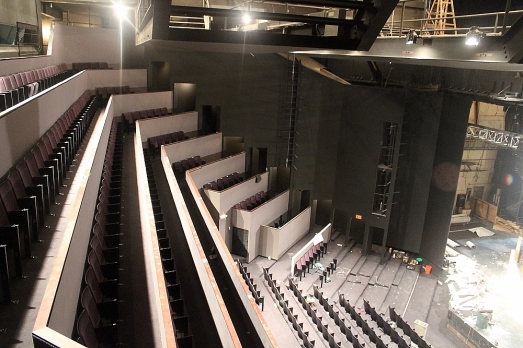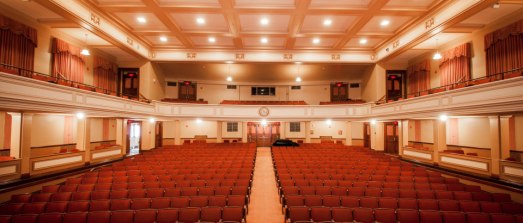
The Rand Theater is the primary performance space that the UMass Amherst Theater Department uses for their large shows, with large amounts of seating and a full array of theatrical aspects including lights, sound, fly rails, removable stage pieces, and a scene shop directly behind it with large bay doors to move scenery back and forth. (Nicholas Calow)
A little while back, I had the pleasure to attend a party at the home of Christine and Sean Doherty in New Hampshire. Christine and Sean (http://www.pointnatural.com), by the way, have each taken a holist approach to science, and both have artistic backgrounds, hers visual, his musical.
While at the party, I was lucky enough to meet Nicholas (Nick) Calow (https://www.linkedin.com/in/ncalow), an undergraduate at UMass Amherst (UMass Amherst). We had a great, if brief, conversation about his academic program, one that he’s put together to address his own strengths and passions. To date, this blog has focused to a large extent on the needs and efforts of university faculty members with regard to arts integration in science teaching, and there was that one post about the few university programs that offer a STEAM focus [link here]. But what about all of those students at universities that don’t offer such programs? How can they negotiate academic programs that address STEAM? This interview with Nick will offer one example.
LD: Hey Nick! So tell me, what year are you at UMass Amherst?
NC: I’m currently a sophomore at UMass, but I expect to be there for five years instead of four because of my double major with Theater and Electrical Engineering.
LD: Okay, so what was behind your decision to do a 5-year double major? Another option, I imagine, would’ve been to do just a single major and maybe a master’s degree later.
NC: My decision came from working over the summer at the Commonwealth Shakespeare Company doing Twelfth Night in Boston Common (http://commshakes.org/). While working there, I saw the type of life theatrical electricians would live, and wanted a bit more than that. I’d already committed to being a theater major, but I figured that an electrical engineering degree on top of that would really help me in the field of design as well as operation. The field I would like to enter is known as stage automation, which is basically using mechanical means to move scenery and lights in a predictable manner, eliminating the human element of scenic manipulation. Since I’d like to design those systems, an engineering degree on top of a theatrical one would be a huge benefit.

M5 is a study and work space for electrical engineering students at UMass Amherst that Nick has used a few times. It has a variety of useful tools and experts in their use who support the students. (Nicholas Calow)
LD: I’ve attended those performances on the Common – wonderful stuff. So your particular intersection of art and science arose from experience in professional theater – I think the real world is often less siloed than the academic world. Is there a typical preparation for stage automation? Would people working in that field have typically have completed a double major similar to yours?
NC:I don’t know many people in the field, but from what I understand many people who are automation techs come from an engineering or a theatrical background, rarely both. A cursory Google search found me this little blurb about it though: http://getinmedia.com/careers/stage-automation-technician. And my plan actually is to design automation systems, so that’s more advanced than being a tech.
LD: Are there logistical challenges that come with this pair of majors – schedule conflicts or expectations of the two departments that don’t fit well together?
NC: There is a large time commitment for both majors, but in very different ways. For engineering, I will need to be doing more homework and tests than hands-on projects, and with theater it is the opposite. When I get higher into both programs, finding enough time for it all will become more of a challenge. Another annoying aspect is the way both majors schedule their classes. With engineering, it is very regular, twice or three times a week for an hour or so, and labs on another day at another time. For theater, there is usually only one or two class times a week, but those times are much longer, and can interfere with the other classes I am taking. As with most college students, I have to be very careful when I make my schedule that nothing overlaps.
LD: So far, have you found any ways to use knowledge or ways of learning/thinking/understanding from one major in courses for the other major?
NC: I haven’t started my engineering major just quite yet, but I can imagine in my lighting and set design classes that knowing advanced math or physics would be of great use. Also, since I’m entering the major at a later date than most would have, I have developed better study skills and time management that some freshmen might not have, which will come in handy once I start being really busy with both majors at the same time.
LD: Do you anticipate doing a project for credit that combines both fields? Is there an option to create your own interdisciplinary directed study or research course? If you did create such a course, would the course have to exist in one department only? Could you have an advisor from each department for that type of course?
NC: In a way, I am already doing something like that. Right now, I am currently working on a project in the theater department under my advisor to utilize an old motor down in the stage trap room to act as a usable piece of technology. Using a bunch of programming that I will be doing myself, my goal is to get the motor to a point where you can interface your laptop computer with it and be able to control every aspect of it; when it starts, how fast it goes, its acceleration, when it stops, and so on. I would imagine that since it’s directed at the stage and solely for the stage, any projects I would do would be based in the theater department, with occasional help by the engineering department.
LD: And what will that motor be used for?
NC: The idea is to use the motor in conjunction with the stage to move large objects through various mechanical means. It could be set under the stage to turn a large rotating platform, it could be attached to a winch to pull a heavy cable on command, it could be used with a pulley to move something across the stage, and so on. After I complete this project, I plan to continue creating a toolbox of sorts for the theater department, learning and improving as I go.
LD: Do you know any other undergraduates who are bridging the divide between art/design and science/engineering/math in their studies?
NC: I’ve found that people who do bridge the gap between art and science are the exception, not the rule. There may be some in assorted examples, but people tend to be in either one or the other, not both. There can be many benefits to what I’m doing with it, as it is guiding and shaping me as I go along, but it also is taking me an extra year to graduate.
LD: Thanks, Nick! It’s been a real pleasure. Please keep me updated on your progress so that we may share it here.


You must be logged in to post a comment.